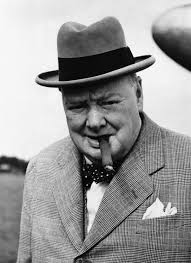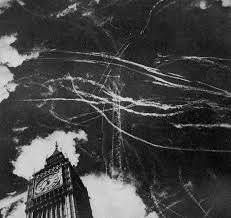With the fate of much of the world hanging in balance in the summer of 1940, all that stood between Hitler and total domination of Europe was the English Channel and about 1500 daring Royal Air Force Pilots. The improbable British victory in the prolonged air battle known as the Battle of Britain turned back the Germans and ranks as one of the seminal moments of the storied military history of the British, remembered alongside the defeats of the Spanish Armada and Napolean. The battle’s impact reverberates far beyond the cliffs of Dover over which so much of it was fought, however. It is no stretch to say the battle changed the course of world history. We as Americans should celebrate it as a seminal moment when one of our strongest allies stood alone in the face of tyranny for all the right reasons, even if we are obliged to at the same time remember that for most of the conflict we stood idly by.
The great British Prime Minister Winston Churchill summed up the stakes before the first shots were fired, after the collapse of France before the Germans:
“…the battle of France is over. I expect that the battle of Britain is about to begin. Upon this battle depends the survival of Christian civilization. Upon it depends our own British life, and the long continuity of our institutions and our Empire. The whole fury and might of the enemy must very soon be turned on us…”

To fully understand the scale of the British accomplishment in turning back the Germans, one must appreciate the context in which it occurred. The battle was actually a months-long fight for control of the skies over the British channel and southern England preparatory for a German invasion. In the summer of 1940 the German Wehrmacht was ravaging through Europe in lightning speed and threatening to extend Hitler’s power across the continent. After the fall of France, essentially all that stood in the way of Nazi domination of Europe was an unprepared and seemingly divided Great Britain. Some high-ranking members of the British government, after all, were already debating whether or not to make a peace with the Germans and their apparently unstoppable and fearsome military when the first raids began following the disaster at Dunkirk. The odds were not good. Indeed, they appeared impossible. The United States watched as a spectator in splendid isolation, convinced the British had no hope of prevailing and unable or unwilling to see the threat to our own ideals and interests posed by Hitler’s Reich.
Enter Churchill, who practically willed his country to resist through his oratory, strength of presence, and diligence.
“Hitler knows that he will have to break us in this island or lose the war. If we can stand up to him, all Europe may be free and life of the world may move forward into broad, sunlit uplands. But if we fall, then the whole world, including the United States, including all that we have known and cared for, will sink into the abyss of a new Dark Age made more sinister, and perhaps more protracted, by the lights of perverted science. Let us therefore brace ourselves to our duties, and so bear ourselves that, if the British Empire and its Commonwealth lasts for a thousand years, men will still say, ‘This was their finest hour!”

Churchill exuded bravado to be sure, but combined it with a shrewd understanding of what could realistically be accomplished by his outnumbered forces. He relied to a great extent on the behind-the-scenes savvy of the Royal Air Force, especially the plan of air defense created by Air Mashal Hugh Dowding. His genius and diligence in the years prior to the war created the intricate air defense system and strategy that would make victory possible. Churchill’s resolve and Dowding’s foresight played out in full view of world, in the form of a continuous air battle that played out over the skies of Britain in the summer and early fall of 1940. Thousands watched as RAF Spitfires engaged German ME-109s and bombers miles overhead—their silent vapor contrails tracking desperate maneuvering and spent cartridges sparkling in the sunlight as they tumbled to the ground sometimes providing the only evidence that a battle was raging due to the height at which it occurred. At other times the roar of the powerful aircraft engines was all too close, as low-level raids on air bases took place at breakfast or lunchtime. At still other times cities such as London were bombed at night as air raid sirens wailed while frantic air defense crews attempted to shine spotlights on the droning bombers in order to fire at them. Thousands of civilians died and many homes and cities were left in ruins, but the British people never wavered. Day after day, their air force inflicted greater losses on the German’s than they sustained, sometimes at a two to one rate. The British reserves were tapped to the limit, though, as the Luftwaffe simply had so many more aircraft to throw at them. They came very near overwhelming the British.

One can’t help but be struck by the determination of Churchill, who embodied the British resolve during the crisis and inspired his country to victory:
“We shall fight in France, we shall fight on the seas and oceans, we shall fight with growing confidence and growing strength in the air, we shall defend our island, whatever the cost may be. We shall fight on the beaches, we shall fight on the landing grounds, we shall fight in the fields and in the streets, we shall fight in the hills; we shall never surrender…”

The line between the conquest of Europe—and much of the modern world—by an evil Fascist regime and the hope of continuation of democrat government in those same areas was razor-thin in 1940. Through leadership, technology, and sheer determination, the RAF managed to hand the German war machine its first setback and buy precious time for the United States to come to the realization of the true nature of the menace the British had stared down. Churchill’s famous remarks on the British success applied primarily to his countrymen, but I believe have a much larger significance:
“Never in the field of human conflict was so much owed by so many to so few.”

The Battle of Britain was a crucial turning point in world history in which the forces of liberty and representative government triumphed over the forces of tyranny. We as Americans should celebrate it along with some of our most steadfast allies in the modern era, the British people.
JMB















